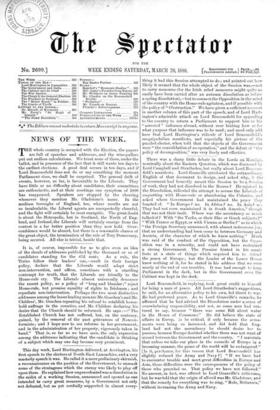Lord Beaconsfield, in replying, took great credit to himself for
being a man of peace. All Lord Stratheden's suggestions, he said, for an alternative policy to his own, led direct to war. He had preferred peace. As to Lord Granville's remarks, he affirmed that he had advised the Dissolution under a sense of overwhelming responsibility, and not, as some men had ven- tured to say, because "there was some Bill about water in the House of Commons." He did believe the state of affairs in Europ, to be critical, if only because the arma- ments were being so increased, and did hold that Eng- land had not the ascendancy he should desire her to possess, because Europe doubted whether there was not want of accord between the Government and the country. "I maintain that unless we take our place in the councils of Europe in a becoming manner, the peace of the world will be endangered." [Is it, perchance, for this reason that Lord Beaconsfielki has slightly reduced the Army and Navy ?] "If we have had to encounter trouble and meet great difficulties in Europe and Asia, those difficulties were the consequences of the policy of those who preceded us. That policy we have not followed." No answer, in fact, was offered to Lord Granville's criticisms, but he was told that the origin of all evil was Mr. Gladstone, and that the remedy for everything was to sing," Rule, Britannia," without increasing the Army and Navy.


































